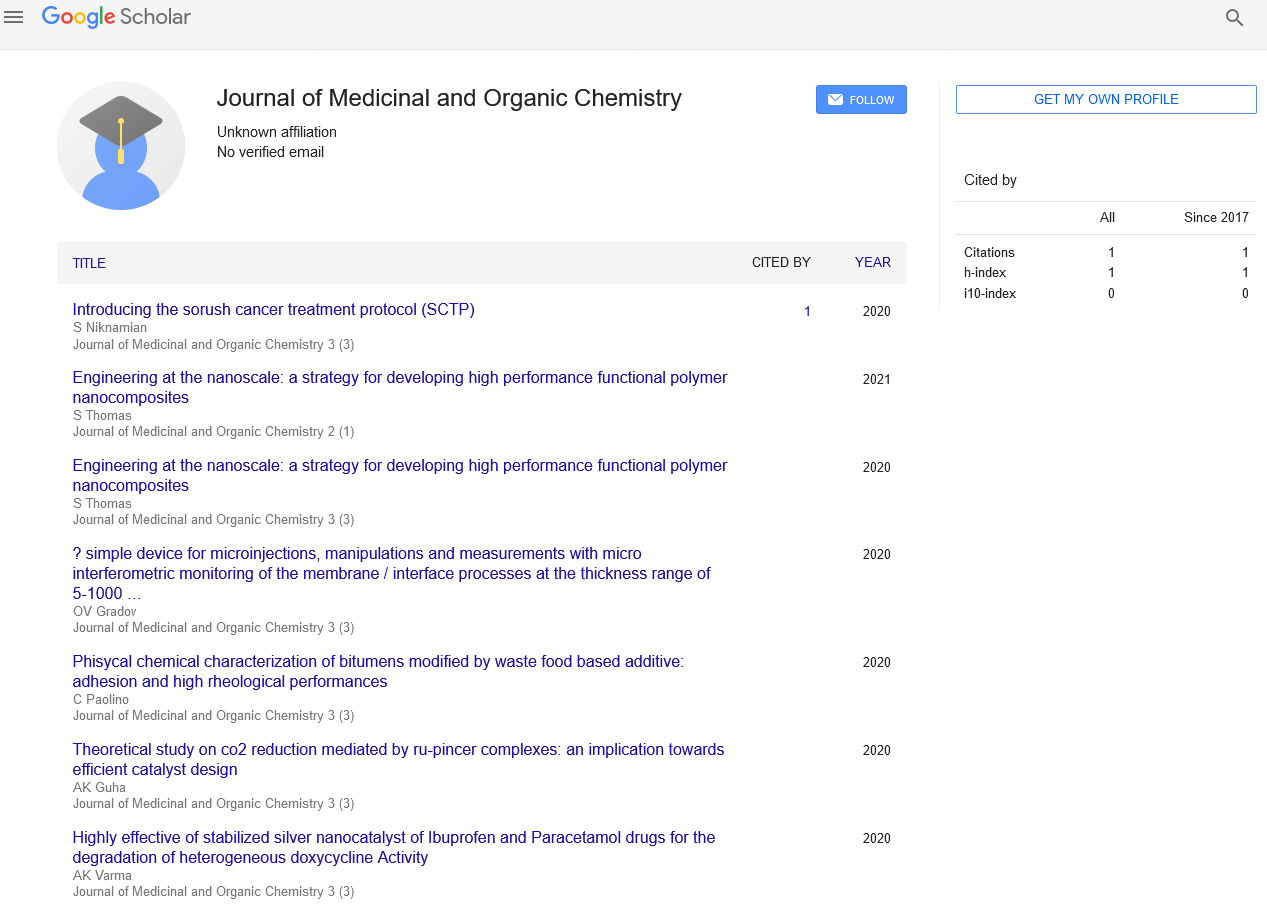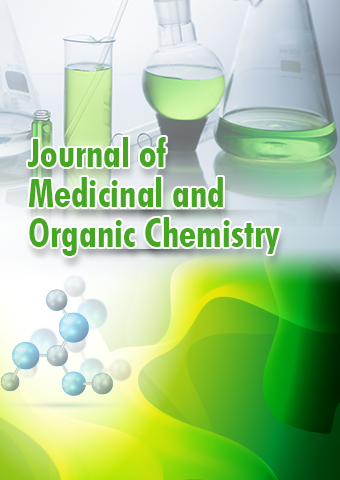Perspective - Journal of Medicinal and Organic Chemistry (2024) Volume 7, Issue 5
Immunology with Organic and Medicinal Chemistry: Advancements and Applications
- Corresponding Author:
- Lindsey Woodworth
Department of Chemistry,
University of Reolega,
Nekemte,
Ethiopia
E-mail: lindsey.woodwo@m.sc
Received: 03-Jul-2024, Manuscript No. JMOC-24-140603; Editor assigned: 08-Jul-2024, PreQC No. JMOC-24-140603 (PQ); Reviewed: 22-Jul-2024, QC No. JMOC-24-140603; Revised: 01- Oct-2024, Manuscript No. JMOC-24-140603 (R); Published: 29-Oct-2024, DOI: 10.37532/jmoc.2024.7(5).253-254
Introduction
Immunology, the study of the immune system and its responses to pathogens, has seen remarkable advancements through the integration of organic and medicinal chemistry. This interdisciplinary approach has facilitated the development of novel therapeutics, diagnostic tools and vaccines that have revolutionized healthcare. This article explores the critical intersections between immunology and organic and medicinal chemistry, highlighting recent advancements and their applications.
Description
Organic chemistry in immunology: Designing small molecules and bioconjugates
Organic chemistry plays a pivotal role in immunology through the design and synthesis of small molecules and bioconjugates that modulate immune responses. Small molecules are particularly valuable due to their ability to penetrate cells and interact with intracellular targets. Organic chemists design these molecules to specifically bind to immune receptors or enzymes, thus modulating the immune response.
One significant advancement is the development of immunomodulatory drugs, such as immune checkpoint inhibitors. These small molecules target proteins like PD-1/PD-L1 and CTLA-4, which are involved in downregulating immune responses. By inhibiting these checkpoints, the immune system’s ability to attack cancer cells is enhanced. For instance, pembrolizumab and nivolumab are monoclonal antibodies targeting PD-1, showing efficacy in treating various cancers.
Bioconjugation techniques, where organic molecules are covalently linked to biomolecules, have also advanced immunology. These conjugates can be used to create more effective vaccines. An example is the conjugation of polysaccharides to proteins in vaccines against bacterial infections like Haemophilus influenzae type b (Hib). The conjugated vaccine induces a stronger immune response, providing better protection, especially in young children.
Medicinal chemistry and immunology: Developing targeted therapies
Medicinal chemistry focuses on the design and optimization of pharmaceuticals, playing a crucial role in developing targeted immunotherapies. The collaboration between medicinal chemists and immunologists has led to the creation of drugs that specifically target immune cells or pathways involved in diseases.
A prominent area is the development of selective kinase inhibitors. Kinases are enzymes that play critical roles in cell signaling, including immune cell activation and proliferation. Aberrant kinase activity is associated with various immune-related diseases, including cancers and autoimmune disorders. Medicinal chemists have developed inhibitors like imatinib and ibrutinib, which target specific kinases involved in these diseases. These inhibitors not only provide therapeutic benefits but also offer insights into the molecular mechanisms underlying immune responses.
Advancements in vaccine development
Vaccines are one of the most impactful applications of immunology and organic and medicinal chemistry have significantly contributed to their development. The recent success of mRNA vaccines for COVID-19 is a testament to this collaboration. mRNA vaccines, such as those developed by Pfizer-BioNTech and Moderna, rely on the synthesis of chemically stabilized mRNA encoding viral antigens. Organic chemists play a crucial role in designing the lipid nanoparticles that encapsulate and deliver the mRNA into cells, ensuring its stability and efficient translation.
Adjuvants, substances that enhance the immune response to an antigen are another area where organic chemistry contributes to vaccine development. Saponin-based adjuvants, like QS-21 are natural products that have been chemically modified to improve their safety and efficacy. These adjuvants are used in vaccines against diseases like malaria and shingles, enhancing the body’s immune response to the administered antigen.
Diagnostic tools and biomarkers
The integration of organic and medicinal chemistry in immunology extends to the development of diagnostic tools and biomarkers. Chemical probes, designed by organic chemists are used to study immune cell functions and signaling pathways. These probes can selectively bind to immune receptors or enzymes, allowing researchers to visualize and measure immune responses in real time.
Biomarkers are crucial for diagnosing diseases and monitoring treatment responses. Organic chemists contribute to the identification and validation of biomarkers by synthesizing molecules that can selectively interact with specific immune components. For example, chemiluminescent and fluorescent probes are used in assays to detect biomarkers in blood samples, providing rapid and accurate diagnostic information.
Medicinal chemists also play a role in developing imaging agents for immunological studies. Positron Emission Tomography (PET) and Magnetic Resonance Imaging (MRI) contrast agents are designed to target immune cells or inflammation sites, enabling non-invasive visualization of immune responses in vivo. These imaging agents are valuable for studying diseases like cancer and autoimmune disorders, as well as for evaluating the efficacy of immunotherapies.
Future directions and challenges
The collaboration between immunology, organic chemistry, and medicinal chemistry continues to drive innovation in healthcare. Future directions include the development of personalized immunotherapies, where treatments are tailored to an individual’s immune profile. Advances in chemical synthesis and high-throughput screening will facilitate the discovery of new immunomodulatory compounds with improved efficacy and safety profiles.
Challenges remain, such as the complexity of the immune system and the potential for off-target effects. A deep understanding of immunology, combined with the precision of organic and medicinal chemistry, is essential to overcome these challenges. Continued interdisciplinary collaboration and advancements in technology will pave the way for novel therapeutics and diagnostics that can address unmet medical needs.
Conclusion
The intersection of immunology with organic and medicinal chemistry has led to significant advancements in the understanding and treatment of diseases. Through the design of small molecules, bioconjugates, targeted therapies and innovative vaccines, these fields have transformed healthcare. As research progresses, the synergy between these disciplines will continue to drive the development of novel and effective immunological interventions, improving health outcomes worldwide.

